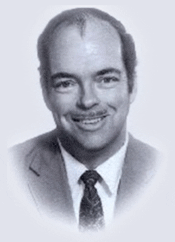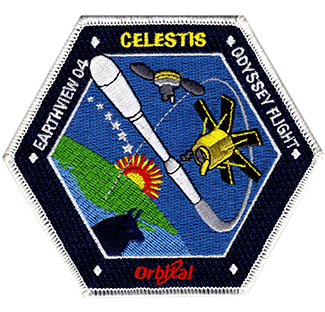Richard "Dick" Duane, Jr. was a Renaissance man for the Space Age. Inquisitive and accomplished, he was passionate about space travel.
Born May 2, 1928 in New York City, Dick was the seventh generation of Duanes in the United States. During the Depression, Dick lived in Mallorca, Spain, and was reared by loving parents who provided a strong foundation for creative intellectual independence. His literary taste was extensive. The Wonderful Wizard of Oz by L. Frank Baum was his first "reader" - and probable source of his love for science and fantasy. His pursuit of Baum's Oz books culminated in a fully assembled collection of the works.
Dick's fascination with astronomy, science fiction, technology, space exploration, and space flight manifested itself in his childhood and grew through adulthood. He valued the quest for knowledge and the ability to pioneer contributions in varied fields. In his life, Dick sought and achieved both.
One of Dick's marked characteristics was his fairness and charitableness toward others. He was a reflective, creative, logical thinker - a man of moral virtues who delighted in using puns. His patriotism was inspirational.
After serving in World War II and the U. S. Army of Occupation in Germany as a radio and communications technician, he entered Union College, majoring in physics. In the early '50s he worked for Bell Laboratories at White Sands Missile Range in New Mexico. Nicknamed "Space," he tested components of Nike and Nike Zeus anti-aircraft systems and was granted a patent: "Muliplex System Employing Polar Modulation" - a method of simultaneously transmitting two messages over the same radio frequency.
As an electrical/communication engineer, technical writer, radar expert, test director, computer programmer, system analyst, pilot, amateur astronomer, and amateur radio operator, Dick's skills were versatile and expert. His technical contributions to the space industry have been commemorated at The U.S. Space Walk of Fame Foundation memorial in Titusville, Florida. Dick's creative side found expression as an award-winning photographer, actor and author.
To dream of space flight was as innate to Dick as "Somewhere Over the Rainbow" was to Dorothy. This ardent interest in space exploration played out professionally as Dick was part of that industry from its infancy. He was the first amateur radio operator to record the beep transmitted by the Russian satellite Sputnik. On Project Mercury he was the defense projects communication engineer assigned to Bermuda and responsible for the intercommunication philosophy in operation at Mercury locations. He invented "dual monitoring" and the hierarchy of communications concept now used universally by missile ranges. When America sent Alan B. Shepard on his sub-orbital flight in 1961, Dick was the Bermuda flight controller. He was planning engineer on the Safeguard System in Kwajalein, Marshall Islands, and test director for the first intercontinental ballistic missile track from Meck Island.
Dick lived life true to himself. All those who knew him lost a true friend and wise counselor; the world, a high-minded advanced soul.
Seldom we find a delicate flower that seems to be particularly favored by nature and grows above others, sustained by firm roots and a strong stem: such was the person of W. Richard Galt Duane, Jr.





